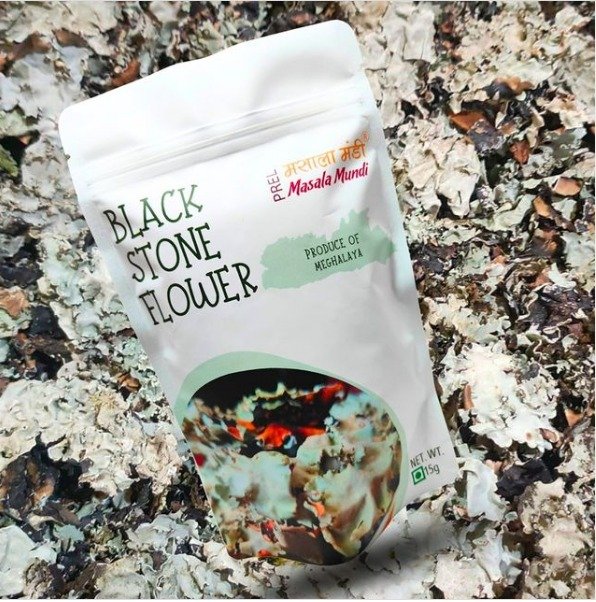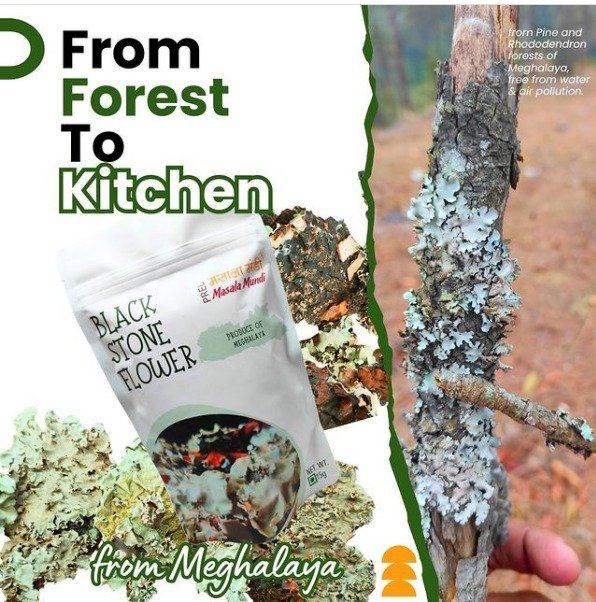Himalayan Black Stone Flower – The Lichen spice from North East India.

Parmotrema perlatum, commonly known as black stone flower, is a species of lichen used as a spice in India. The species occurs throughout the temperate Northern and Southern Hemispheres. Typically used in meat dishes like nihari (paaya), Bombay biryani, and goat meat stews, it is also used in vegetarian dishes.
In its raw state, black stone flower does not have much taste or fragrance. However, when put in contact with heat, especially hot cooking oil or ghee, it releases a distinctive earthy, smoky flavour and aroma. This property of black stone flower is especially valued in the tempering step of cooking a number of Indian dishes

Properties of Stone Flower:
- It may have wound healing properties
- It may show analgesic activity (pain relieving) for the liver, stomach, and uterus.
- It helps with its anthelmintic activity against worms.
- It may have antimicrobial properties.
- It may show carminative (relieving flatulence) activity
- It may have astringent properties
- It may have mild laxative properties
- It may show diuretic activity
- It may have sedative properties.
Potential Uses of Stone Flower For Antioxidant Activity:
In studies the ethanolic extract of the stone flower exhibited significant antioxidant potential and a good free radical scavenging effect. In addition, the methanolic extract of the stone flower in a study showed noteworthy antioxidant activity when tested in phosphomolybdenum reduction and 2,2′-diphenyl-2-picrylhydrazyl (DPPH) assay. These claims may need further research to establish their effect on humans.
Potential Uses of Stone Flower For Cytotoxic Activity:
The methanolic extract of the stone flower was found to have cytotoxic activity and exhibited antiproliferation against colon cancer cell lines in studies. However these studies were performed on animals and human studies will be needed to understand a similar impact on humans.
Potential Uses of Stone Flower For Hypolipidaemic Activity:
The methanolic extract of the stone flower exhibited significant hypolipidaemic activity when tested by an in-vitro anticholesterol assay. However, these effects need to be ascertained by more research.
Potential Uses of Stone Flower For Antibacterial Activity:
The acetone, ethyl acetate, and methanolic extract of the stone flower was studied to have significant antibacterial activity against Staphylococcus aureus. In addition, studies show the hydro-alcoholic extract of the stone flower was found to be significantly active against Pseudomonas aeruginosa, Bacillus cereus, Proteus vulgaris, Escherichia coli, S. aureus, Klebsiella pneumoniae, and Corynebacterium xerosis.
The antibacterial potential of stone flower might be due to the presence of usnic acid. The methanolic extract of the stone flower also exhibited significant antibacterial activity against some Gram-positive foodborne bacteria. The aqueous-methanolic extract of the stone flower was also effective against P. aeruginosa, B. cereus, E. coli, Bacillus pumilus, S. aureus, Citrobacter freundii, K. pneumonia, and Streptococcus pneumoniae.
Potential Uses of Stone Flower For Antiviral Activity:
The polysaccharide fraction of the stone flower was investigated for cytotoxicity on cell lines, and it was found to possess specific antiviral potential against the yellow fever virus that attacks the viral envelope.
Potential Uses of Stone Flower For Hepatoprotective Activity:
The aqueous slurry of stone flower exhibited significant hepatoprotective activity when investigated in a rat model. However these studies are conducted on animals and not much evidence available for its effect on humans. Please consult a doctor for treatment of liver related issues and do not self-medicate.
Potential Uses of Stone Flower For Antiurolithiatic Activity:
The hydro-alcoholic extract of stone flower exhibited significant antiurolithiatic (reduced formation of crystallizing salts) activity when tested in an in-vitro model.
Though there are studies that show the potential use of stone flower in various conditions, but these are insufficient and there is a need of further studies to establish the true extent of benefits of stone flower on human health.
Precautions to Take With Stone Flower:
There are no major side effects reported with the use of stone flower, but you must consult your doctor if you experience any side effects.





